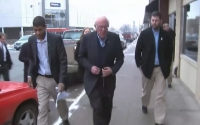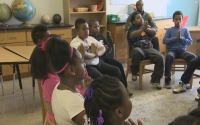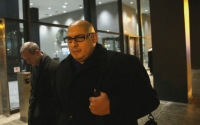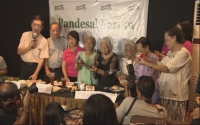A 16-year-old’s new cancer test could save hundreds of lives
"TechKnow" correspondent Kosta Grammatis talks to Jack Andraka, a 16-year-old scientist and researcher from Maryland who made headlines when he won the grand prize at the 2012 Intel International Science and Engineering Fair for his new method of detecting pancreatic cancer.

Jack credits the loss of a close family friend with the inspiration for his cancer research, though it's clear that he grew up in an environment that encouraged scientific thought.
"He always was very persistent," says Jack's mother Jane, an anesthetist. "We just raised our kids to be curious and creative."

Curiosity and creativity has lead to great things for both Andraka children. Jack's older brother Luke was also a Science Fair winner, as well as an MIT THINK (Technology for Humanity, guided by Innovation, Networking, and Knowledge) award recipient.
"There was strong sibling rivalry during science fair," Jack tells Grammatis. "We would compete all the time."

"With a lot of things, you know, they might ask questions, and we'd say 'Well, figure it out yourself,'" says Jack's father Steve, who works as a civil engineer. The family's motivation to foster their sons' scientific pursuits ranged from general encouragement to physical exhaustion, as Jane recalls long hours waiting for Jack outside of a laboratory at Johns Hopkins University.

"I would just sit out there, hour after hour, until my poor little iPod and iPhone would run out of batteries," she laughs, never once doubting that seven months of research would pay off. "It was really exciting that one day in late winter when he came out, late at night, and it had worked."
Jack's method of cancer detection, which is being touted as a faster, cheaper and more effective option, checks patients for high levels of mesothelin, a cancer biomarker which can be detected in blood or urine at earlier stages than previous tests for pancreatic and lung cancers.

“A hundred people die of pancreatic cancer every day,” Andraka tells Grammatis when asked about his determination. “My motivation was, ‘How am I going to help save a hundred lives today?’”
Jack became an internet sensation after his exuberant celebration when his name was called as the winner of the Gordon E. Moore award, the grand prize at the ISEF, “a childhood dream come true” according to Andraka. “It was absolutely crazy,” he says, “as you could see by my reaction.”
His parents and teachers were just as thrilled. "To see your child's childhood dream come true, what could be better than that?" Jane recalls proudly.
"Seeing somebody like Jack succeed at his age... I think that will allow students to understand that it is possible, that they could do it if they wanted to," says Jack's science teacher Robert Warrilow.
Jack's newfound celebrity has propelled him into meetings with patent lawyers, biotech CEOs and even President Obama. But the teenager is still trying to stay grounded (in between TED talks) and use his talents and resources to create positive change in the world.
"One of the most valuable lessons I've learned throughout this entire experience is that, as a young person, typically your ideas don't really get heard," Andraka tells Grammatis as he sits in the United Nations building, preparing to speak at the Nexus Youth Summit. "But as an influencer, your ideas do get heard."
He may not consider himself a role model just yet, but there's no doubt that as he continues to pursue his work in science, this young influencer is going to be heard.


























Error
Sorry, your comment was not saved due to a technical problem. Please try again later or using a different browser.